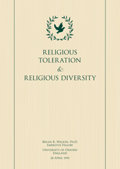From the foregoing examples of religious belief systems, it is apparent that belief in a supreme being is an inadequate criterion of religion. Despite the lingering, out-dated prejudice of some Christian commentators, this point would generally be immediately endorsed by comparative religionists and sociologists of religion. Status as a religion would not be denied to Buddhism, Jainism or Hinduism, the absence of any conception of a supreme being or creator-god notwithstanding. If these examples of pantheistic and atheistic, but none the less indisputably religious, belief-systems present a contrast to Christian ideas of what a religion should resemble, so too do polytheistic beliefs, even though these are less easily presented in organized or coherent form. Taoism, now generally regarded as a religion in the textbooks of comparative religion, provides such a case. In contrast to revealed religions, Taoism draws on nature worship, mysticism, fatalism, political quietism, magic, and ancestor worship. For centuries it was officially recognized in China as an organized religion, with temples, worship, and clergy. It entertained conceptions of supernatural beings, including the Jade Emperor, Lao-Tzu, Ling Po (marshal of supernatural beings) and the Eight Immortals of Chinese folklore, the City God, the God of the Hearth, among others, together with innumerable spirits. Taoism lacks, however, a supreme creator, a saviour-god of the Christian kind and an articulated theology and cosmology. The case of Taoism illustrates the fact that religions do not arise fully-fledged as systems of belief, practice, and organization. They undergo processes of evolution in all these aspects, sometimes coming to embrace elements entirely at variance with earlier conceptions. Accretions of myth and ritual and changes in organization have been normal in the history of religion, and some of these new elements are at times only partially assimilated and are by no means always rendered compatible one with another.
XIX. Diversity among Religions: Polytheism

Scientology, Social Science and the Definition of Religion
by James A. Beckford, Professor of Sociology, University of Warwick, England

Social Change and New Religious Movements
by Bryan R. Wilson,
Emeritus Fellow in Sociology, Oxford University

The Church of Scientology
by Juha Pentikäinen, Marja Pentikäinen, University of Helsinki, Finland

The Relationship Between Scientology and Other Religions
by Fumio Sawada, Eighth holder of the secrets of Yu-itsu Shinto, the oldest religion in Japan; President, Ahlul-Bait Center

The Religious Nature of Scientology
by Geoffrey Parrinder, Methodist minister, Professor, Comparative Study of Religions, University of London

Religious Philosophy, Religion and Church
by G.C. Oosthuizen, Professor of Science of Religion, University of Durban-Westville, Natal, South Africa

Scientology a New Religion
by M. Darrol Bryant, Department of Religious Studies, Renison College, University of Waterloo, Ontario, Canada

Apostates and New Religious Movements
by Bryan R. Wilson,
Emeritus Fellow in Sociology, Oxford University

Scientology: An Analysis and Comparison of its Religious Systems and Doctrines
by Bryan R. Wilson,
Emeritus Fellow in Sociology, Oxford University

The Reliability of Apostate Testimony About New Religious Movements
by Lonnie D. Kliever Ph.D., Professor of Religious Studies

The Sea Organization and its Role Within the Church of Scientology
by Frank K. Flinn Ph.D. Adjunct Professor in Religious Studies

Brief Analyses of the Religious Nature of Scientology
by J. Gordon Melton, Baylor University, Samuel Hill, Gary Bouma, Irving Hexham

Congregational Services of the Church of Scientology
by Bryan R. Wilson,
Emeritus Fellow in Sociology, Oxford University

Is Scientology A Religion?
by Alan W. Black, Associate Professor of Sociology, University of New England, Armidale, New South Wales, Australia

Is Scientology a Religion?
by Dean M. Kelley, National Council of Churches

Religious Toleration & Religious Diversity
by Bryan R. Wilson,
Emeritus Fellow in Sociology, Oxford University

Scientology A Religion In South Africa
by David Chidester, Professor of Comparative Religion, University of Cape Town, South Africa

Scientology: A True Religion
by Urbano Alonso Galan, Professor of Philosophy and Theology, Gregorian University of Rome

Scientology: A Way of Spiritual Self-Identification
by Michael Sivertsev, Moscow Academy of Sciences

Scientology: A Worshipping Community
by Lonnie D. Kliever, Southern Methodist University, Dallas, Texas

Scientology and Contemporary Definitions of Religion in the Social Sciences
by Alejandro Frigerio, Professor of Sociology, Catholic University of Argentina, Buenos Aires

Scientology and Islam an Analogous Study
by Fumio Sawada, Eighth holder of the secrets of Yu-itsu Shinto, the oldest religion in Japan; President, Ahlul-Bait Center

Scientology and Religion
by Christiaan Vonck, Rector, Faculty for Comparative Study of Religion, Antwerp, Belgium

Scientology: A Comparison with Religions of the East and West
by Per-Arne Berglie, Professor of History of Religion, University of Stockholm

Scientology Its Cosmology, Anthropology, System of Ethics and Methodologies
by Régis Dericquebourg, Professor of Sociology of Religion, University of Lille III, France

Scientology – Its Historical-Morphological Frame
by Dario Sabbatucci, Professor of History of Religions, University of Rome

Scientology: Its True Nature
by Harri Heino, Professor of Theology, University of Tampere, Finland

Scientology: The Marks of Religion
by Frank K. Flinn, Adjunct Professor of Religious Studies Washington University

